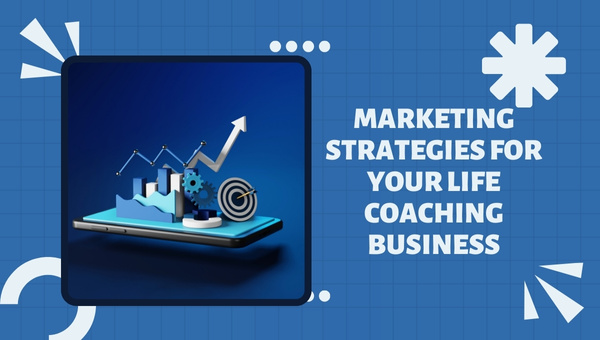As someone who finds joy in mentorship and helping others master their personal and professional lives, starting a life coaching business has always been my passion. It allows me to use my years of experience to guide others towards achieving their full potential.
But how does one begin this journey? The process can seem daunting, especially if you’re stepping without a roadmap.
Whether you’re transitioning from a traditional job or are entirely new to the coaching industry, I’m here to share the information you need on how to start a life coaching business.
Navigating the world of life coaching involves more than just understanding people; it requires strategic planning to wear many hats, including that of a marketer, networker, and entrepreneur.
Like starting any business, breaking down the process into manageable steps will make it less stressful and more achievable.
My personal experience has taught me that there are key fundamental steps anyone interested in establishing their practice must consider. Following them religiously can turn your aspiration into reality quicker than you imagine
Initial Steps On How to Start a Life Coaching Business

Before anything else, you must determine your niche. This focus area will help you target specific clients and their needs.
Next, get educated – find a coaching program that fits your intended discipline, aligns with your principles, and offers comprehensive training for honing your skills.
Also, consider obtaining professional certification – although not always a requirement, certification adds credibility to your services.
And formulate your business plan early on. Remember to cover crucial details such as financial projections, your target market strategy, and the operations necessary for running the business. With these initial steps in place, the foundation of your life coaching business begins to form.
Developing Your Unique Coaching Technique
Developing your unique coaching style is fundamental to the success of your business. To be an effective coach, you must genuinely understand yourself. Take time to identify your strengths, weaknesses, and what motivates you.
This self-awareness will influence the approach you use to guide others. For instance, if you are naturally empathetic and intuitive, your coaching may lean towards understanding a client’s emotional landscape.
Recognizing what sets you apart from others in the field is essential. Having a specialty or niche could distinguish your practice significantly.
Whether it’s executive coaching or helping people with work-life balance – carving out a specialty can make your services appealing to a particular demographic.
Understanding these aspects helps create a unique coaching model that resonates with your target audience and showcases why clients should choose you over competitors.
Certification and Training: Are They Necessary?

Many aspiring to become a life coach often question the importance of certification and training. While you might possess innate coaching abilities, formal training can significantly enhance your coaching prowess.
Professional organizations like the International Coach Federation (ICF) offer thorough coaching programs that provide you with recognized certifications upon completion.
Although possessing these credentials is not mandatory, I’ve found that they lend credibility, boost confidence, and give you a competitive advantage in the industry.
Remember, clients seek reassurance that they are entrusting their personal or professional development journey to a qualified professional.
ICF‘s certifications are globally accepted and could be worth considering on your journey to becoming a successful life coach.
Building a Business Plan and Structure
Every entrepreneur knows the pertinent role of a well-structured business plan; it’s the foundation upon which your life coaching business will stand.
Craft your plan details, incorporating all elements like target market analysis, outlining services (and pricing), financial projections, and marketing strategies.
A sound structure aids in smooth operations. Deciding whether to operate as an LLC or sole proprietorship can impact your taxes and liability.
For most life coaches, starting as a sole proprietorship can be sufficient, but transitioning to an LLC might be prudent as you grow.
SBA Small Business Administration offers resources on writing a business plan and deciding on your business structure, benefiting first-time entrepreneurs immensely. Moreover, consider seeking legal advice to ensure total compliance with local laws.
Marketing Strategies for Your Life Coaching Business

A robust marketing strategy is essential to attract clients and build your credibility as a life coach. Here are some exceptional marketing strategies that can be tailored to suit your business’s unique needs:
Content Marketing
This involves creating and sharing valuable free content to attract and convert prospects into clients and clients into repeat buyers. Sharing helpful tips, strategies, or thoughts on your blog or YouTube channel can position you as an expert in your niche.
Social Media Advertising
Leverage platforms like Facebook, Instagram, LinkedIn, and Twitter. Engage with your audience directly by answering their queries quickly and sharing value-adding content consistently. These platforms also offer cost-effective advertising opportunities for broader reach.
Email Marketing
One of the most efficient ways to maintain engagement with potential and existing clients is email marketing. Keep them informed about upcoming events- webinars/workshops- or share self-improvement tips regularly.
Referral Program
Happy clients will likely refer you to their network; hence, developing a referral program offering discounts or rewards can encourage more referrals.
Webinars and Workshops
These allow you to share your expertise effectively while generating leads for your coaching business.
Search Engine Optimization (SEO)
Implement SEO strategies on your website to rank high on search results when potential clients look for life coaches online. Utilize keywords related to life coaching in your content effectively.
Networking Events
Connect with other coaches at networking events; they might refer clients who aren’t a good fit for them but may be perfect for you.
Influencer Partnerships
Partnering with influencers in the self-improvement area can lend significant visibility to your coaching practice across their follower base.
Testimonials and Case Studies
Showcasing client success stories, including testimonials, builds trustworthiness among potential clients. Case studies paint a vivid picture of what people gain by working with you, inclining them toward booking sessions themselves.
Podcast Sponsorships
Sponsoring relevant podcasts can help raise awareness of your services among interested listeners who likely want life coaching services.
Accordingly, linking every aspect of these strategies with Google Analytics helps track how well they’re working, enabling necessary adjustments.
Also Read About Is a Masters In Mental Health Counseling Worth It?
Growth Plan: Scaling Your Life Coaching Business
Scaling your life coaching business entails raising standards and improving your services. When you’re ready to take those next significant steps, here’s what you should focus on:
Hiring More Coaches
As demand increases, consider bringing on board more life coaches to ensure quality service delivery. Hire professionals reflecting the same values and approaches as your business.
Expanding Geographically
Ascertain untapped markets by conducting extensive market research. Expansion can be physical or virtual, with virtual platforms providing easy accessibility to international clients.
Offering New Services
Diversify your service portfolio based on market demands or business trends. Introduce new packages or coaching specialties that align with client needs.
Investing in Technology
For streamlined business operations, incorporate technology solutions like CRM software, online booking systems, etc.
Ensure continuous professional growth through learning and offering services based on genuine client requirements.
Systems like Gusto can assist with smooth HR operations as you scale up, while a beginner-friendly CRM like Zoho could facilitate superior customer management.
Maintaining an agile approach towards scaling and adapting quickly to changes while maintaining quality service will ensure sustained growth.
Key Challenges and How to Overcome Them in Life Coaching Business
Starting and running a successful life coaching business isn’t always rosy. Here are key challenges you might encounter and viable solutions:
1. Attracting Ideal Clients: Attracting clients perfectly fitting your service suite could be challenging initially. Build your brand’s authentic story, let people know exactly who you are as a coach and what you can offer them, and it will automatically attract the right audience.
2. Getting the Word Out: New ventures often grapple with reaching potential clients. Implement a thorough online/offline marketing strategy incorporating social media, SEO, word-of-mouth referrals, etc., for optimum visibility.
3. Managing Time Effectively: Balancing client sessions, marketing tasks, and admin duties can feel daunting sometimes. Prioritize tasks effectively and consider using management tools like Asana or Trello for efficient tracking.
Always remember your unique message and service offering can make you stand out amidst the competition.
Leveraging Strategic Content and Impressive SEO For Your Coaching Business
Starting a life coaching business requires much more than competence in coaching; it demands efficacious marketing strategies. Building an unwavering online presence plays a paramount role in this digital age.
One potent way to accomplish this is by utilizing strategic content types that not only engage your potential clients but also position you as a top-tier expert in the market.
Websites such as Icontester offer an extensive range of cutting-edge services to optimize your platform while assisting you in transforming the way you conduct your business online.
Through different content formats from research blogs, testimonials, infographics, and many more, IconTester helps create personalized strategies that grab attention and win over prospects.
As a life coach, developing compelling personal stories or anecdotes along with engaging case studies not only offers value to your subscribers but also substantiates your expertise in the field.
IconTester strives towards formulating such unique and compelling evergreen content that leaves a lasting impact on your readers.
SEO plays an instrumental role in boosting your online visibility. When embarking on the journey of building your life coaching business, assuring a remarkable online presence is essential and may often seem intimidating.
That’s where resources provided by IconTester like advanced keyword research, SERP ranking tracking, schema markup for better visibility come into play offering comprehensive SEO services tailored just for you. Their team continually monitors Google algorithm compliance for optimal performance of your coaching website to draw maximum mileage out of it.
With IconTester’s proficiency in the panorama of business automation services like establishing an expansive affiliate network or delivering complete site audits, they stand as empowered facilitators who drive one’s journey from starting their life coaching endeavor to surpassing market competition successfully.
Algorithm compliance & regular monitoring form an integral part of any successful online strategy – thankfully with the help of platforms like iContester, navigating through this complex process becomes significantly easier.
Conclusion
Starting a life coaching business is more than just being able to inspire and guide; it also requires strategic planning, perfecting your craft, creating visibility, and overcoming challenges.
Remember, align every aspect of this business with your values – from your approach to coaching to the type of clients you attract.
Following these steps will equip you with an excellent runway for launching into the promising world of life coaching. May your journey as a life coach be one marked by success stories that underline genuine growth, positivity, and transformation of lives.

